Latin America. General characteristic Plan: Topography Climate Resources

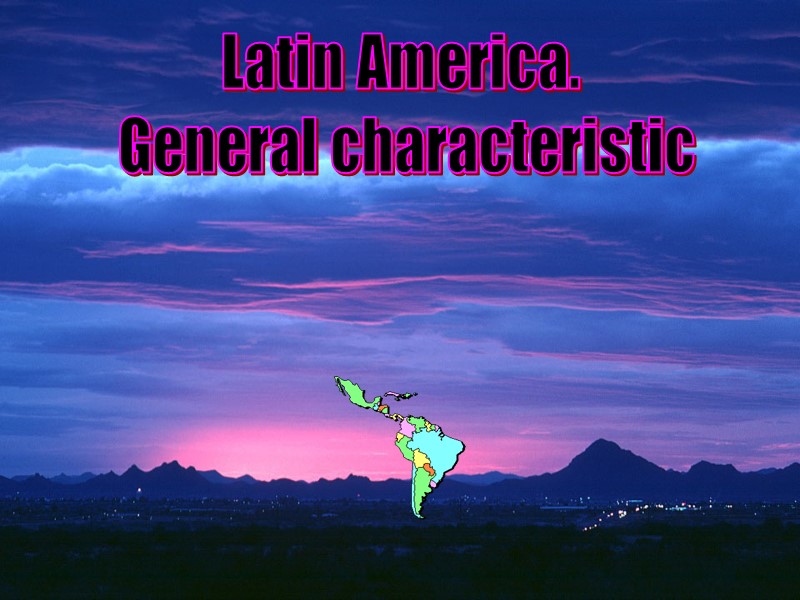
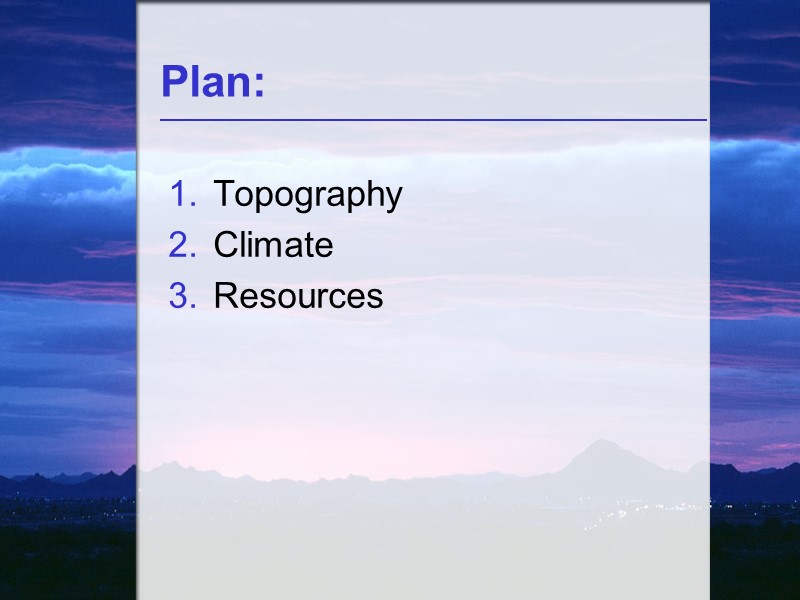
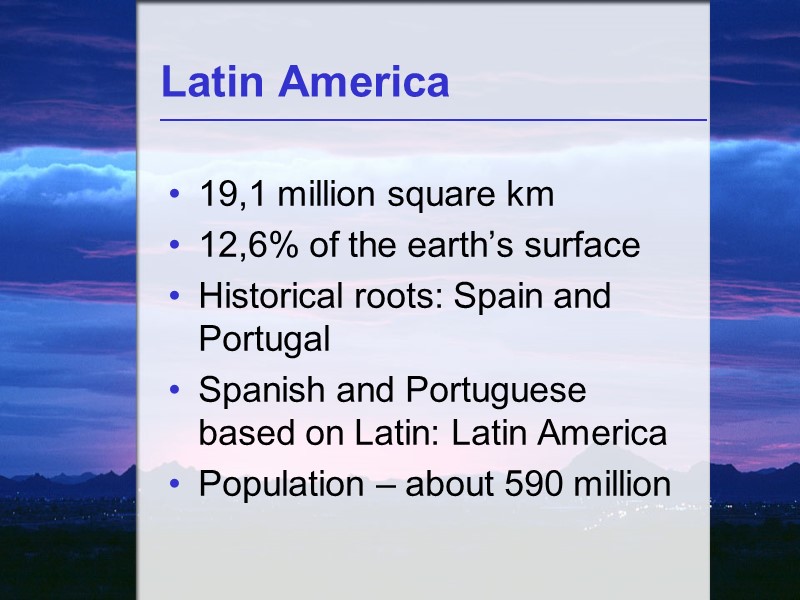
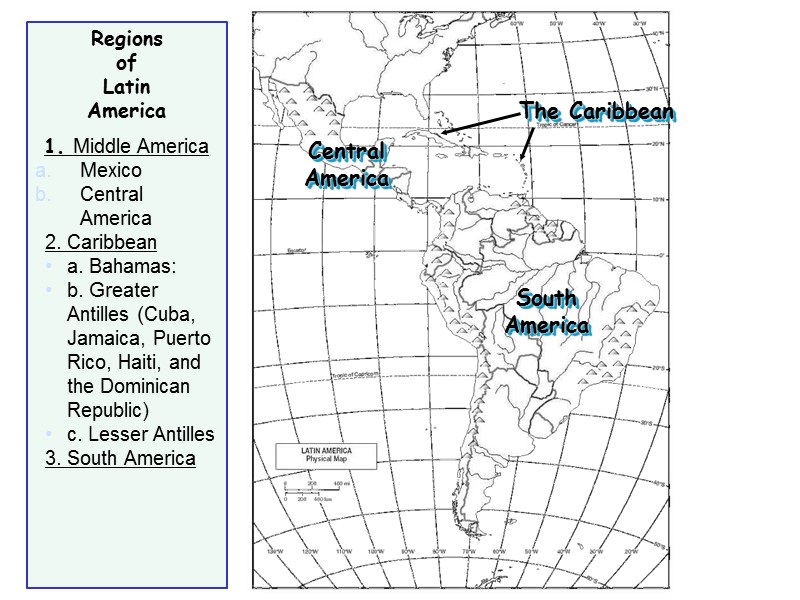
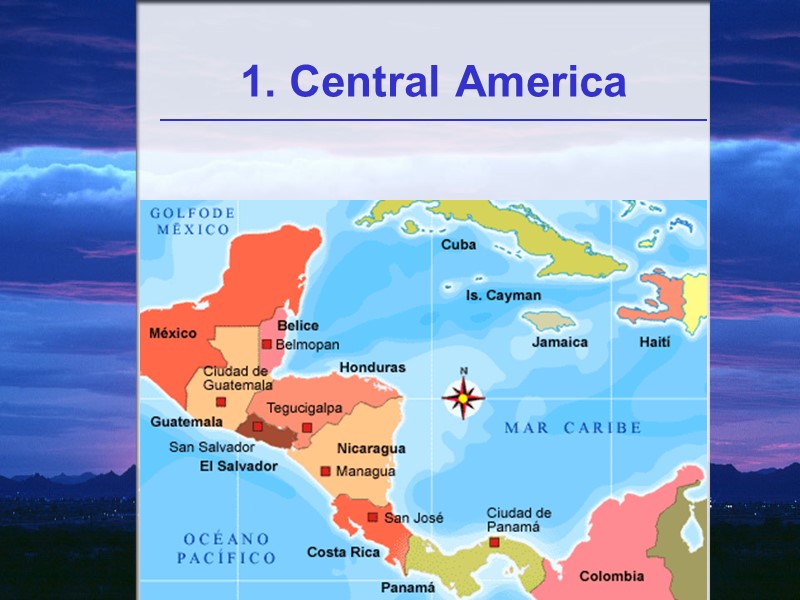
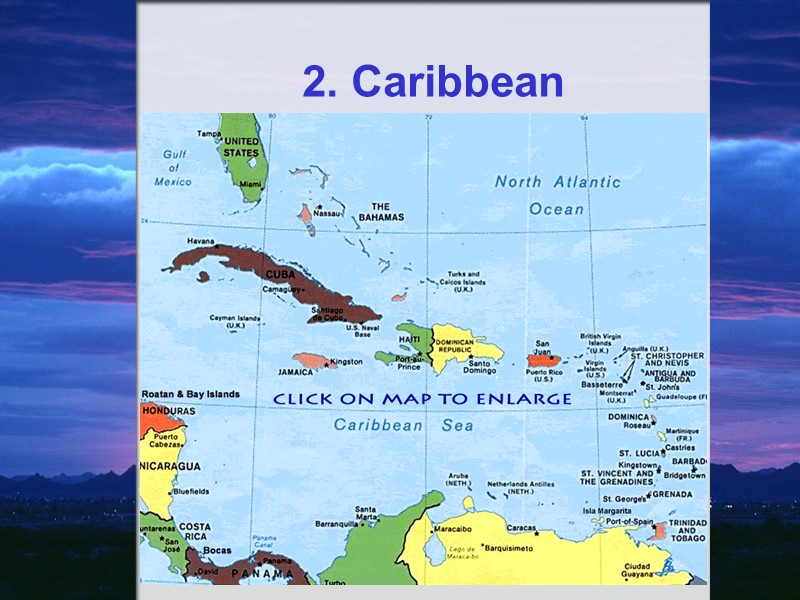
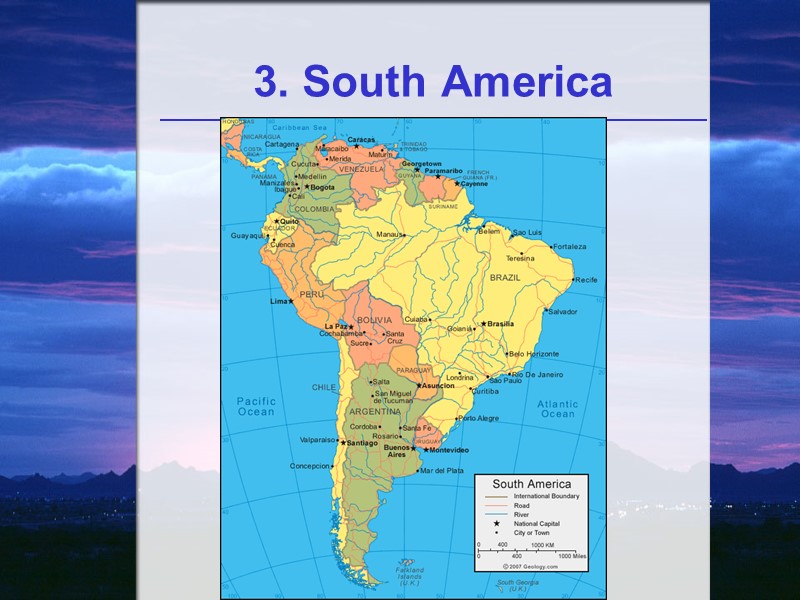

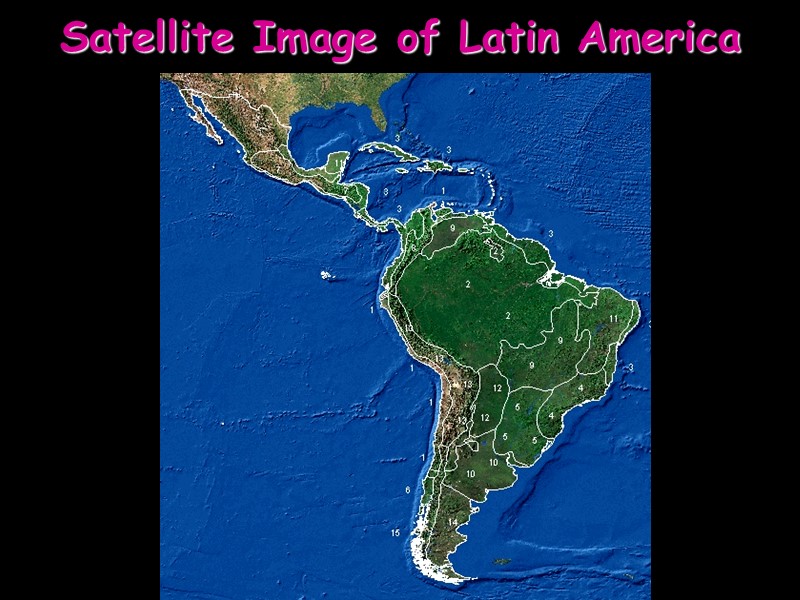
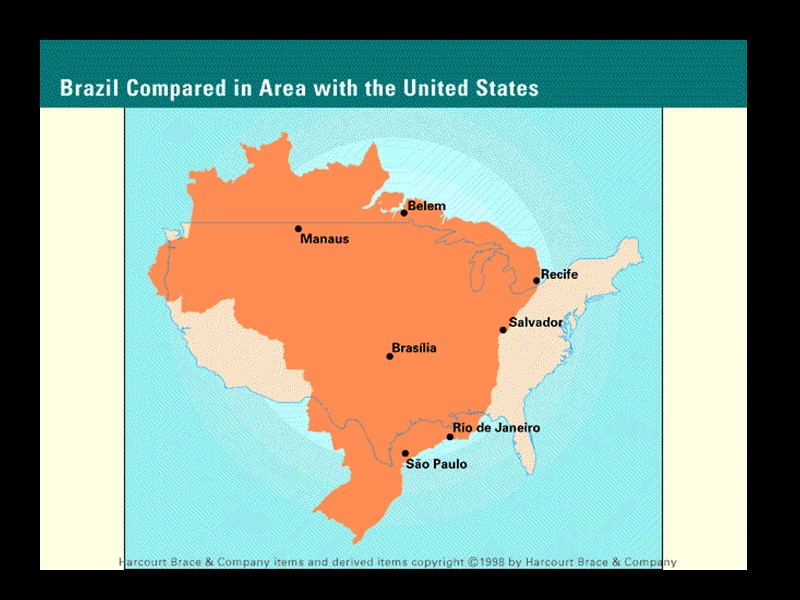
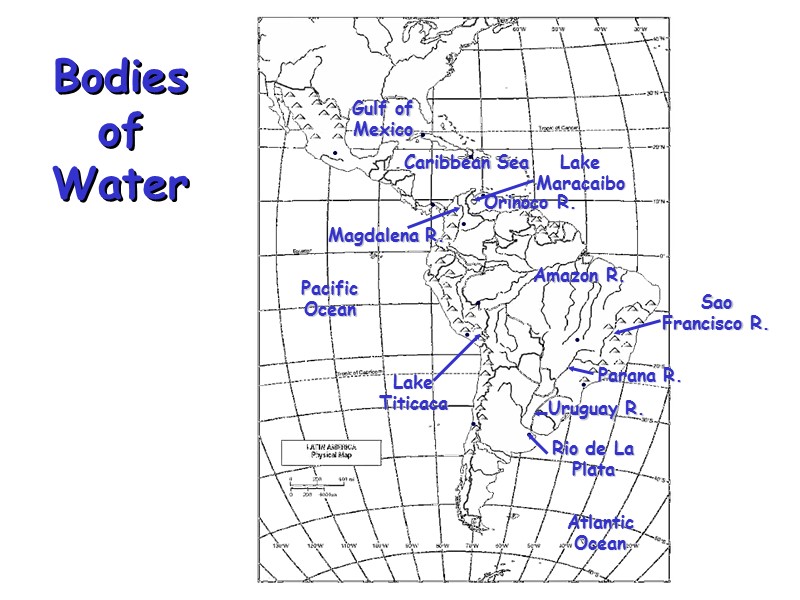
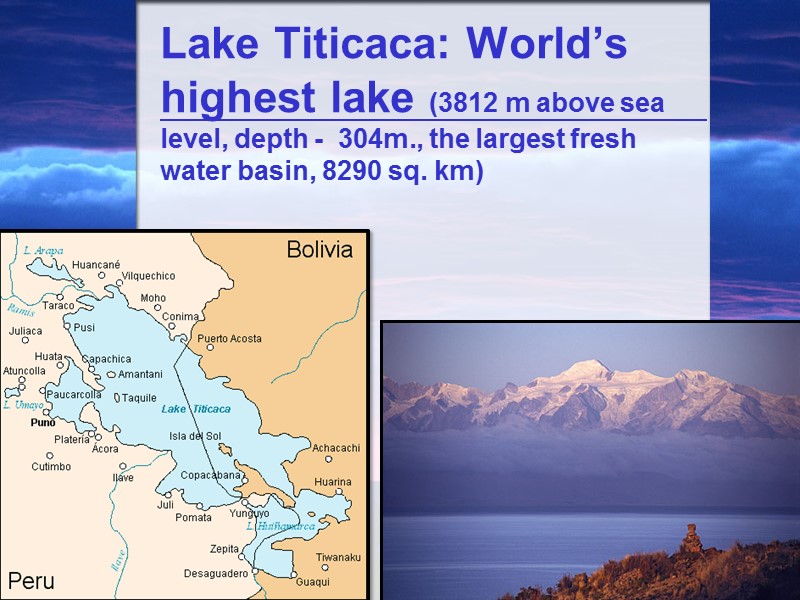
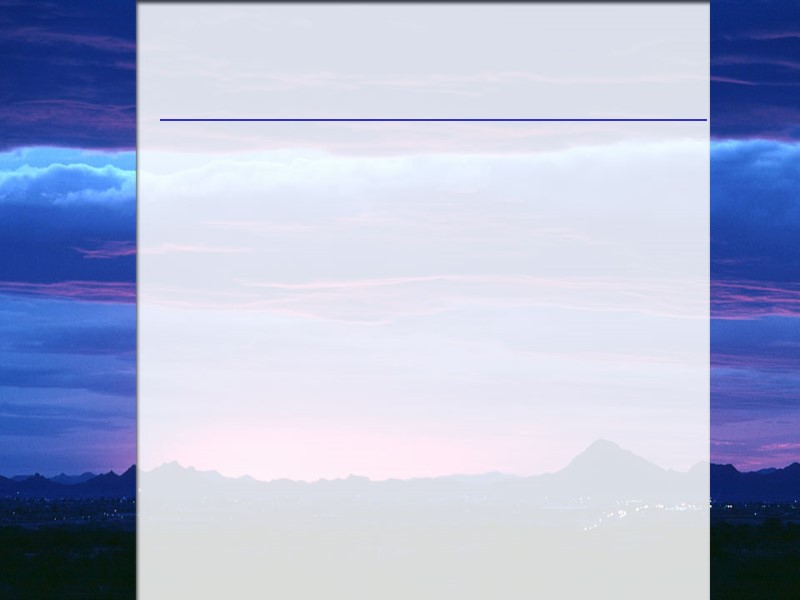
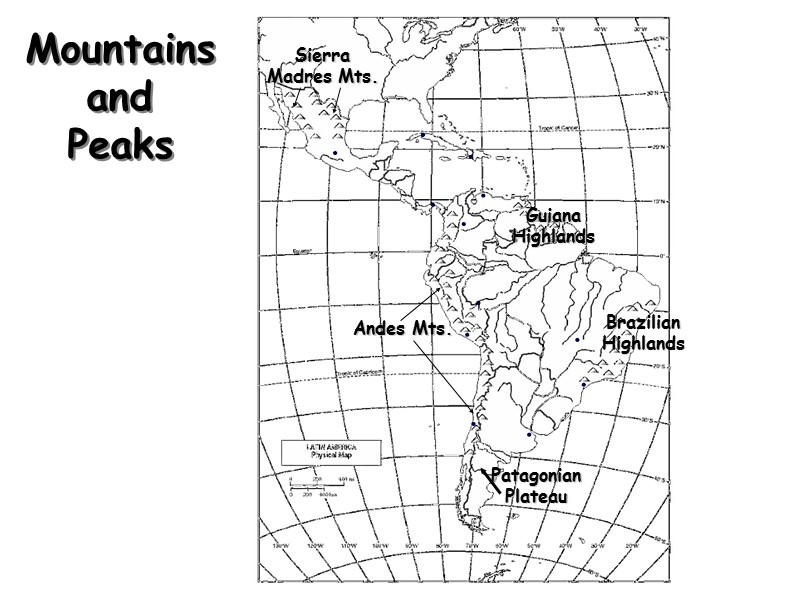
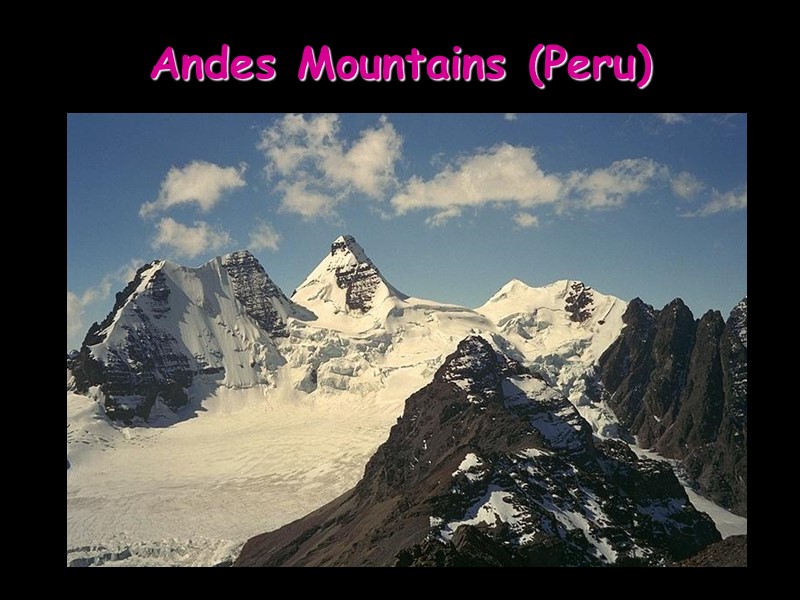
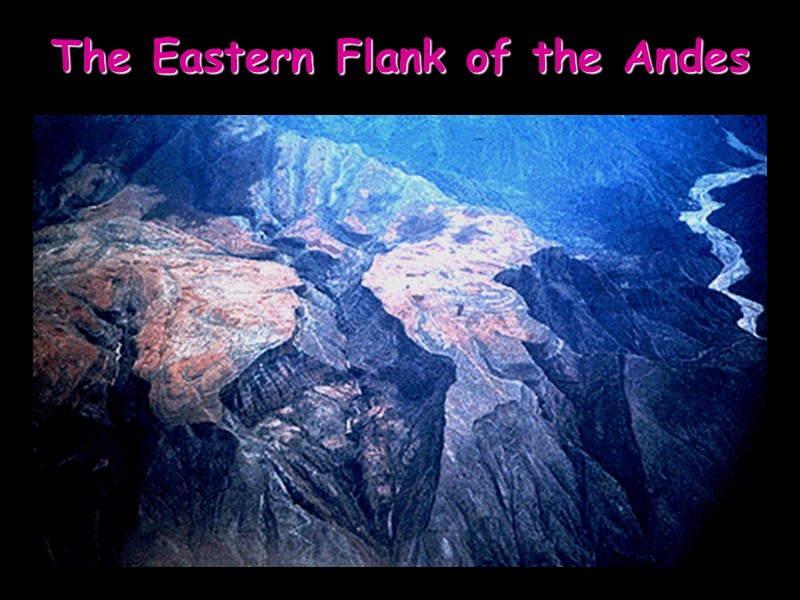
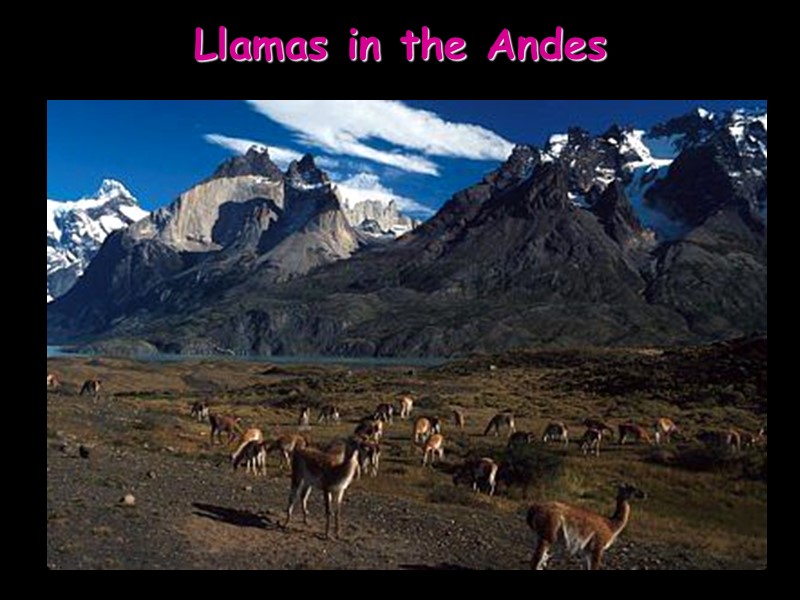
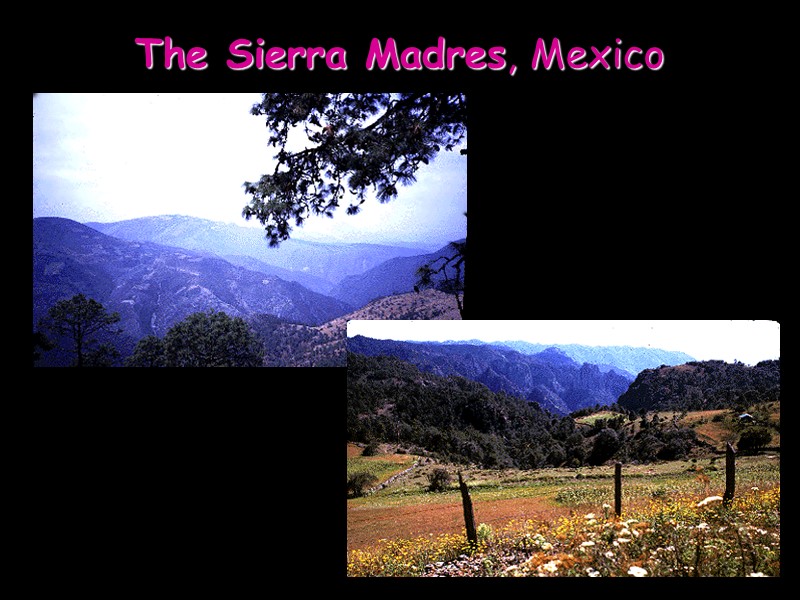
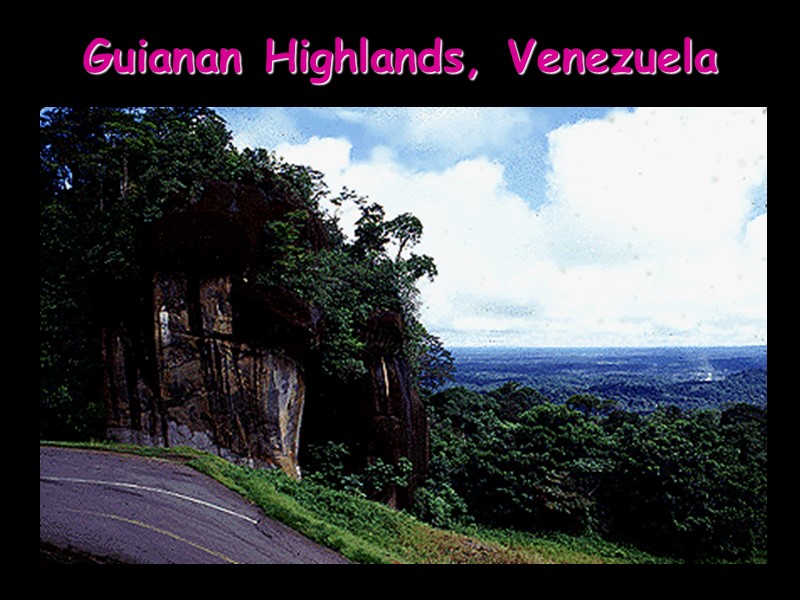
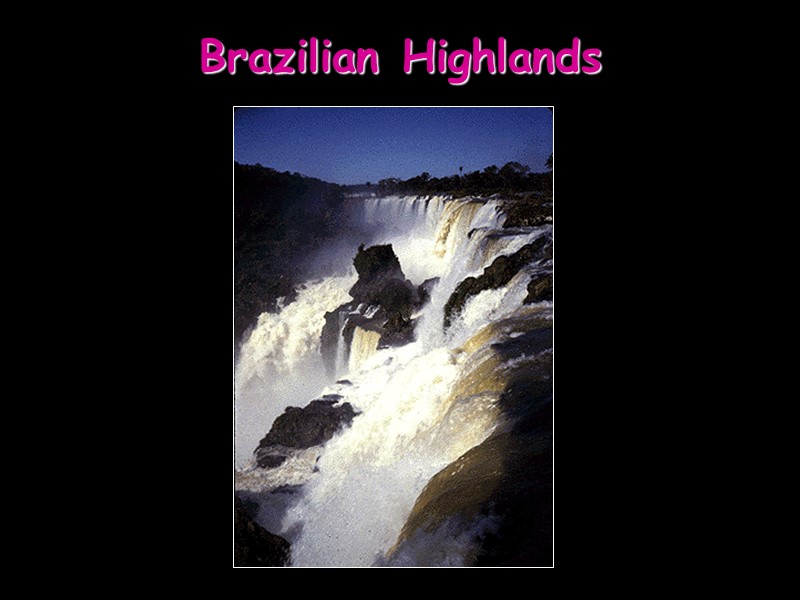
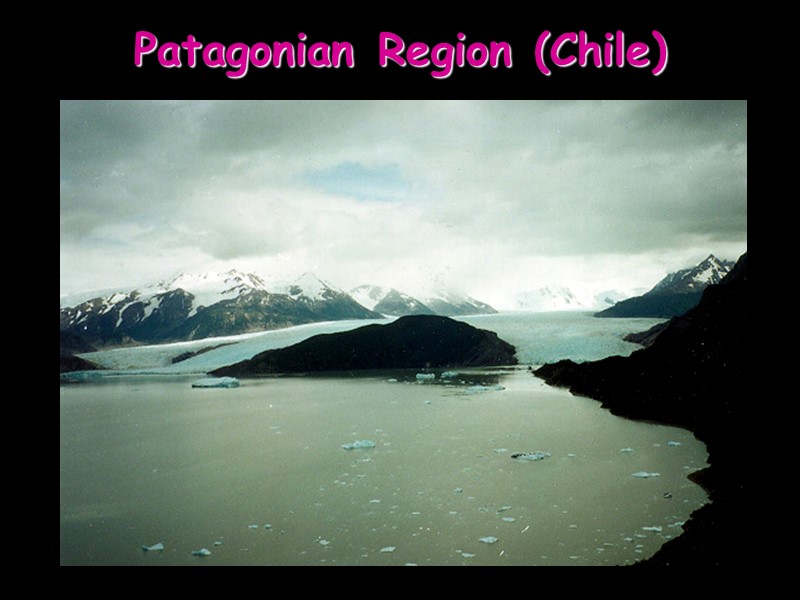
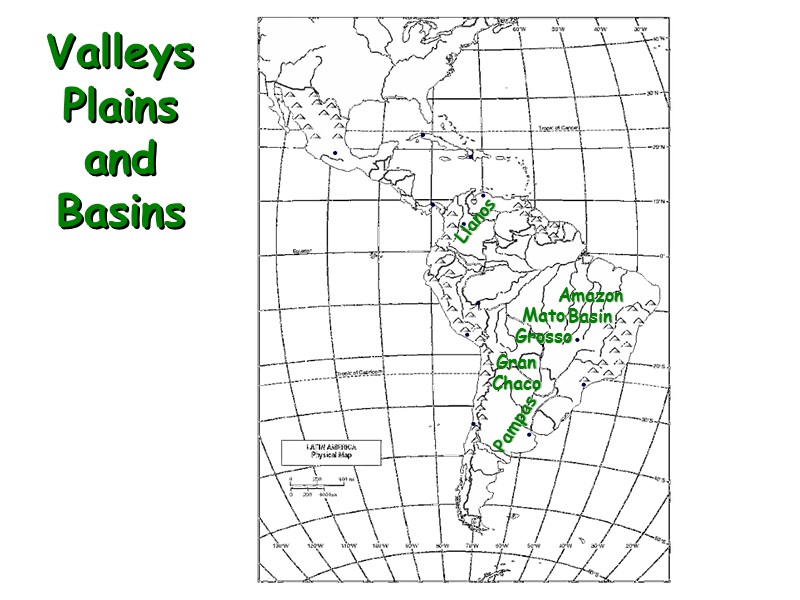
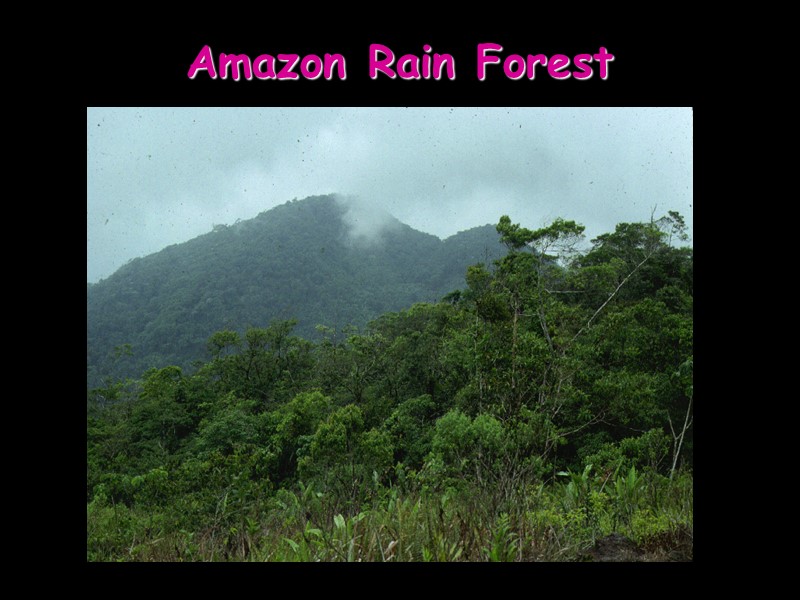
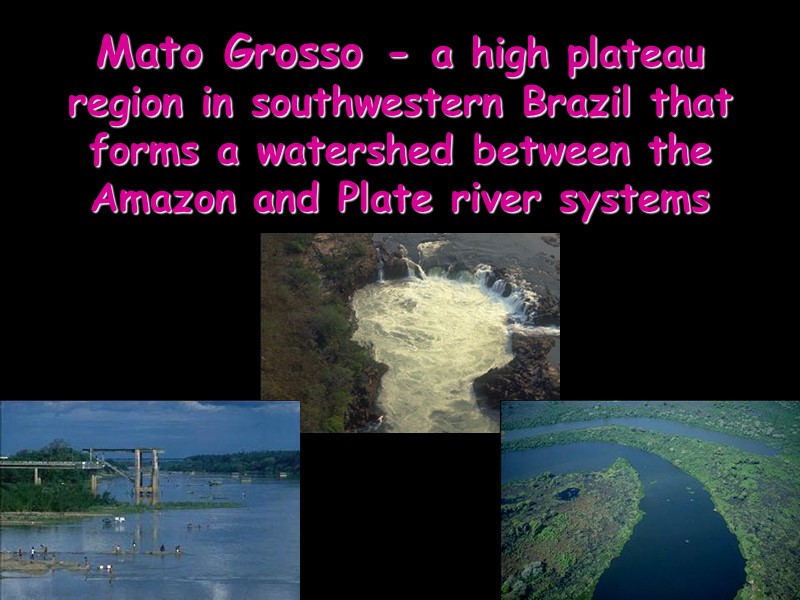
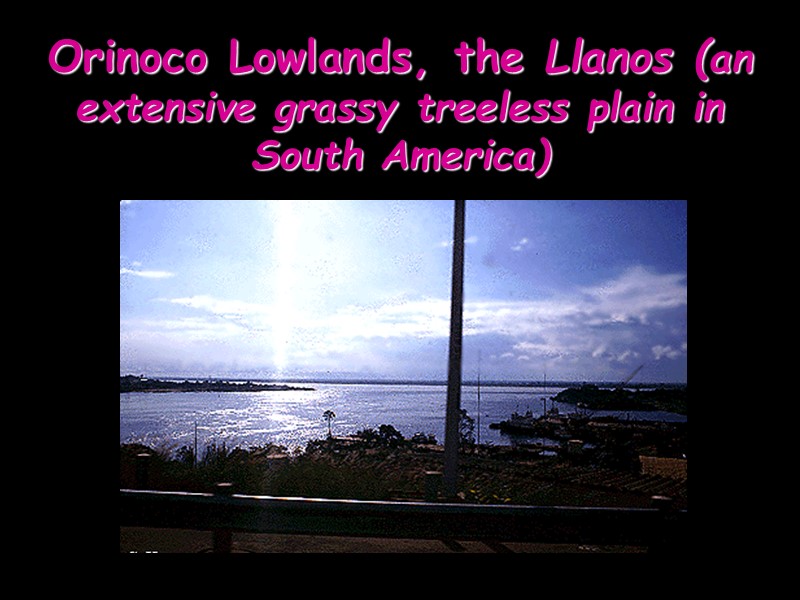
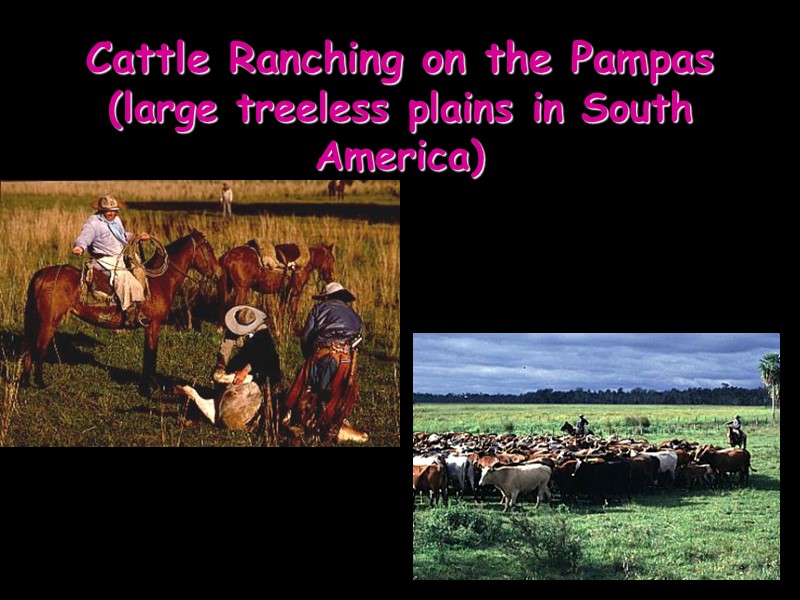
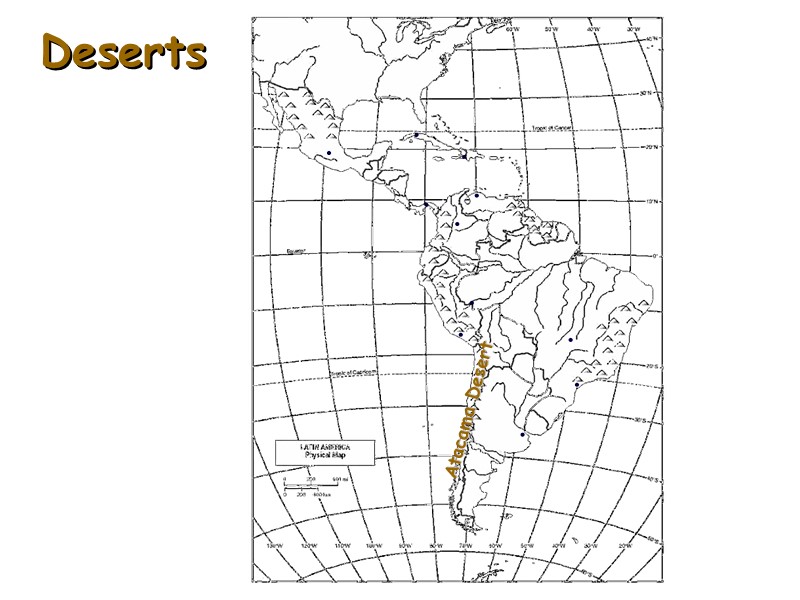
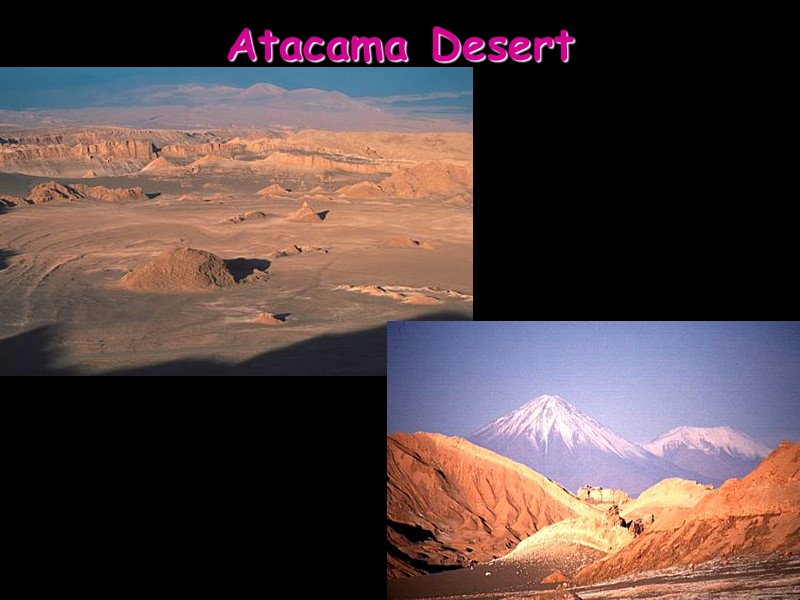
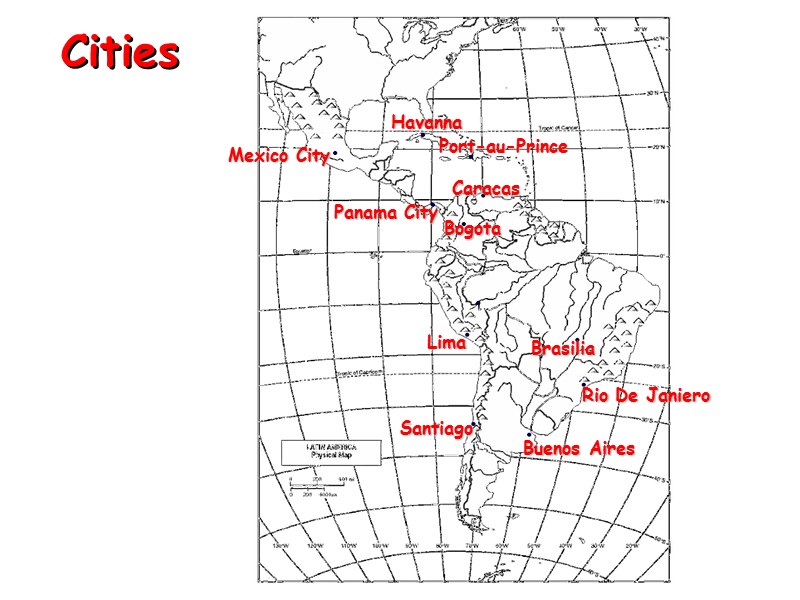
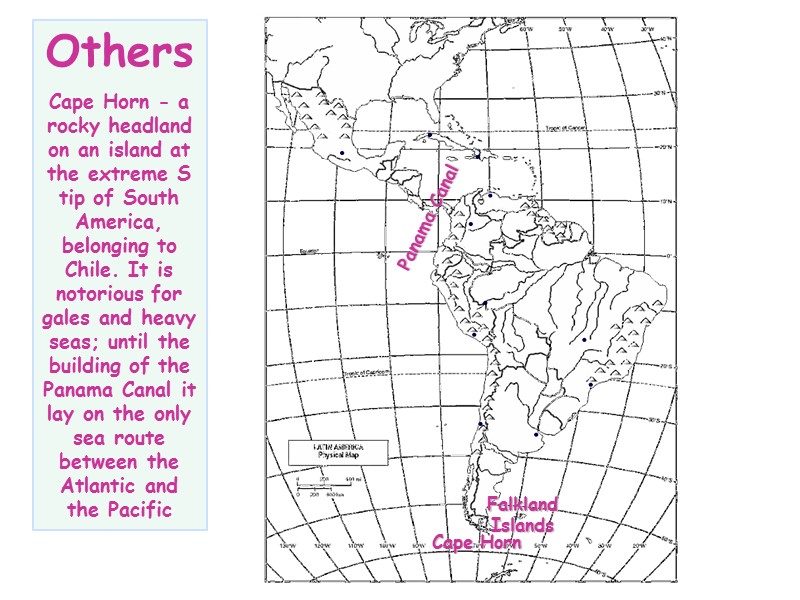
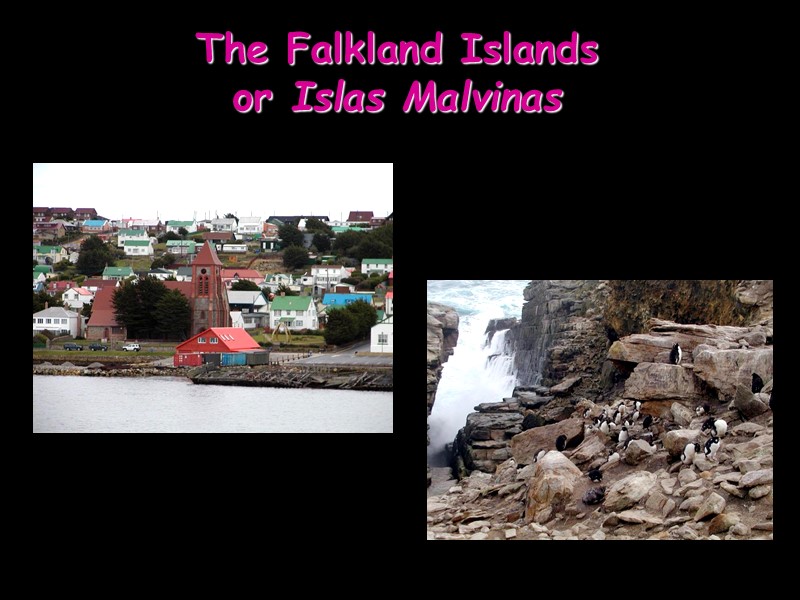
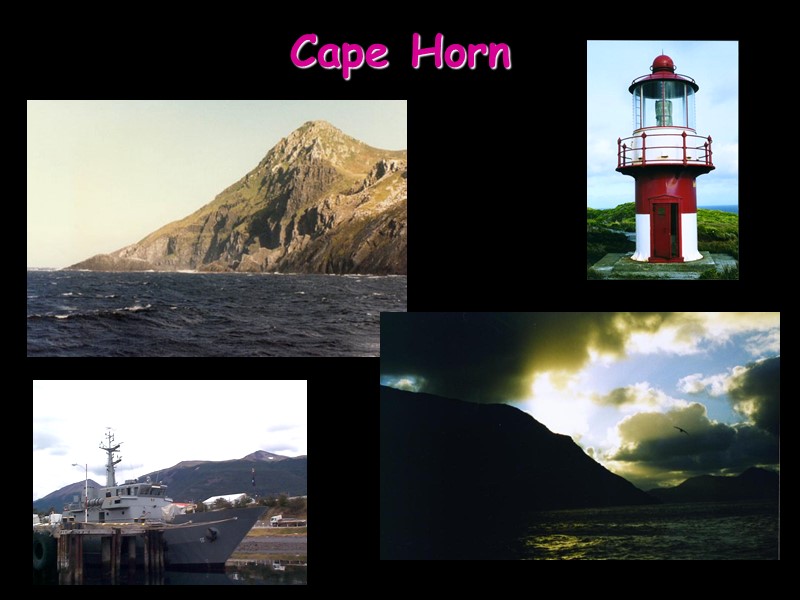
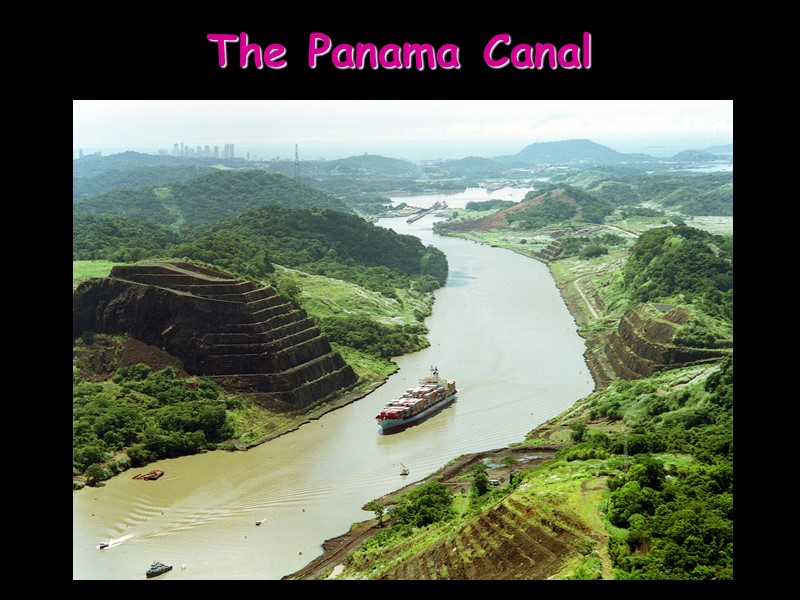
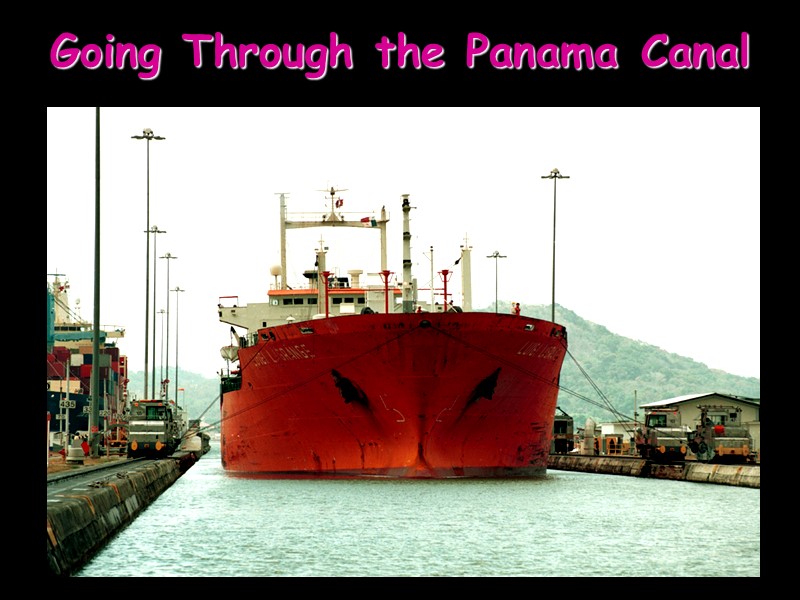
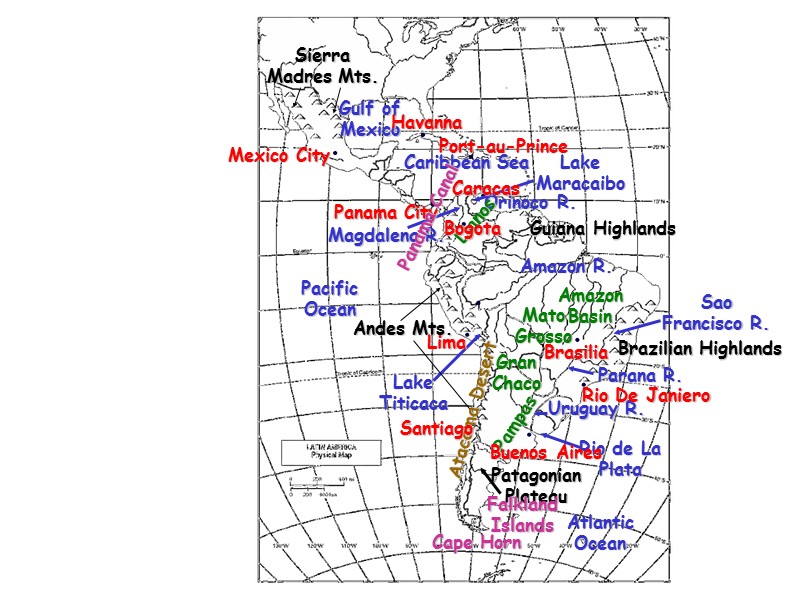
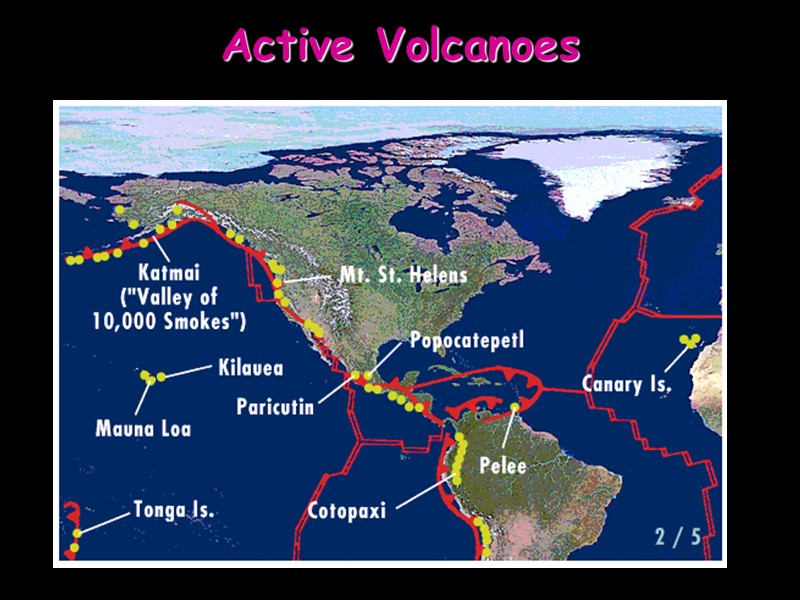
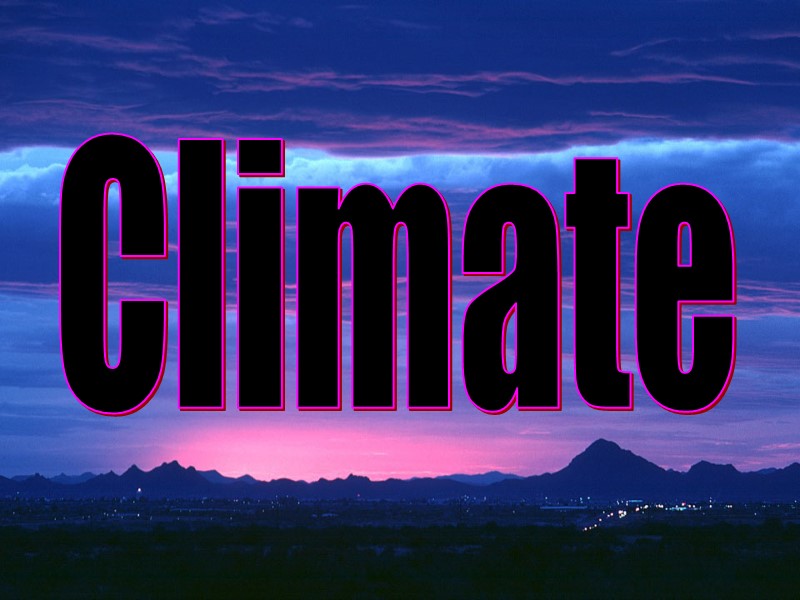
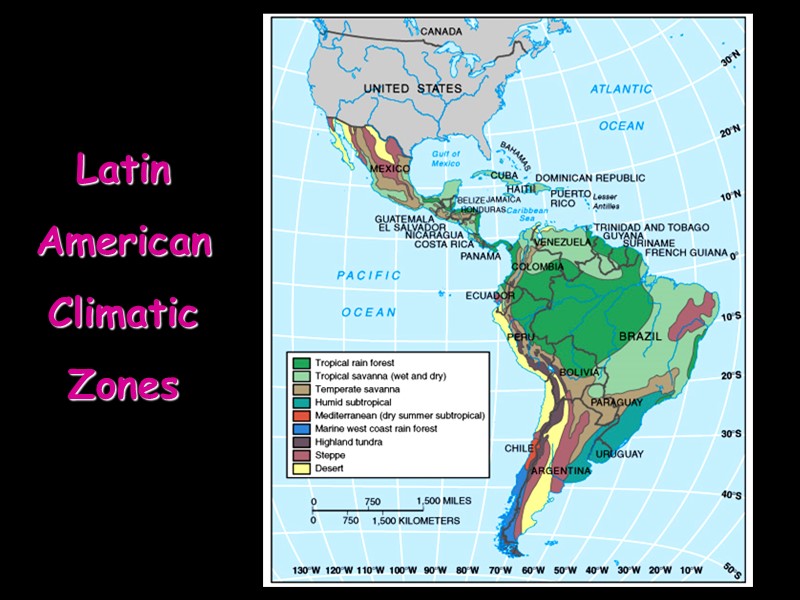
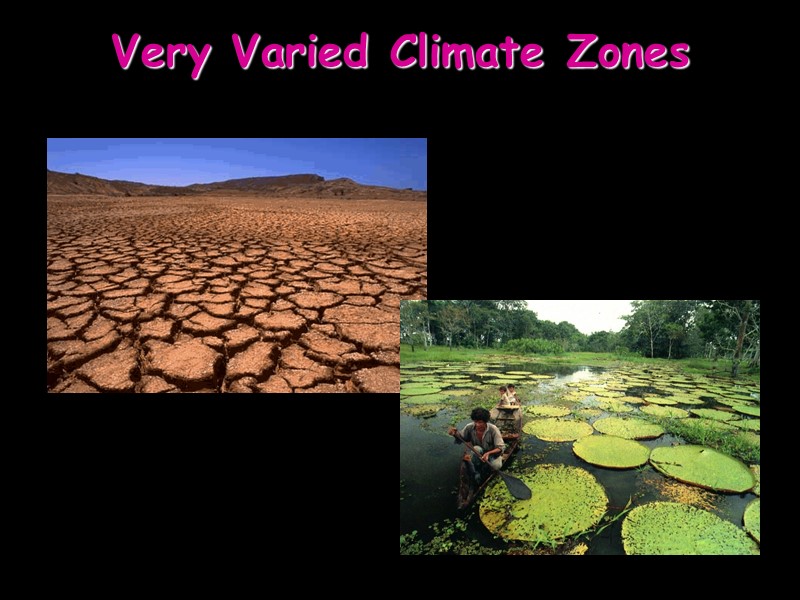
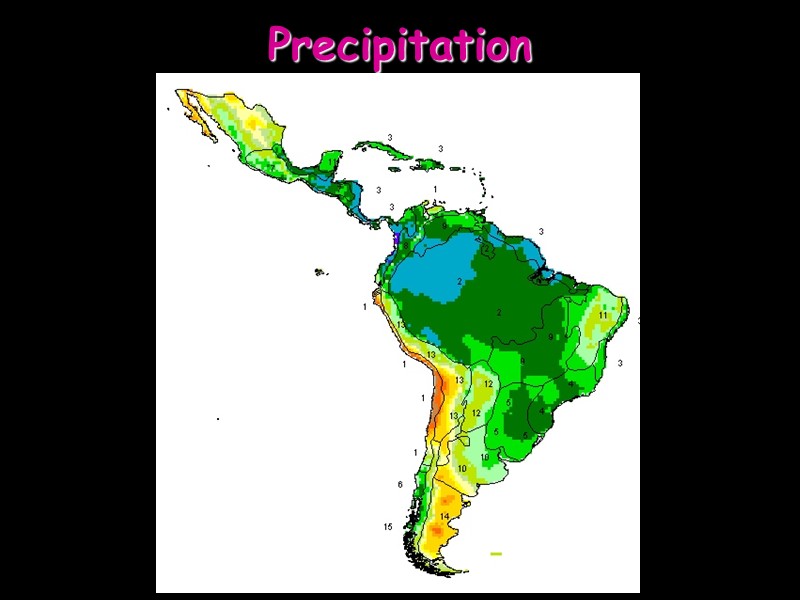
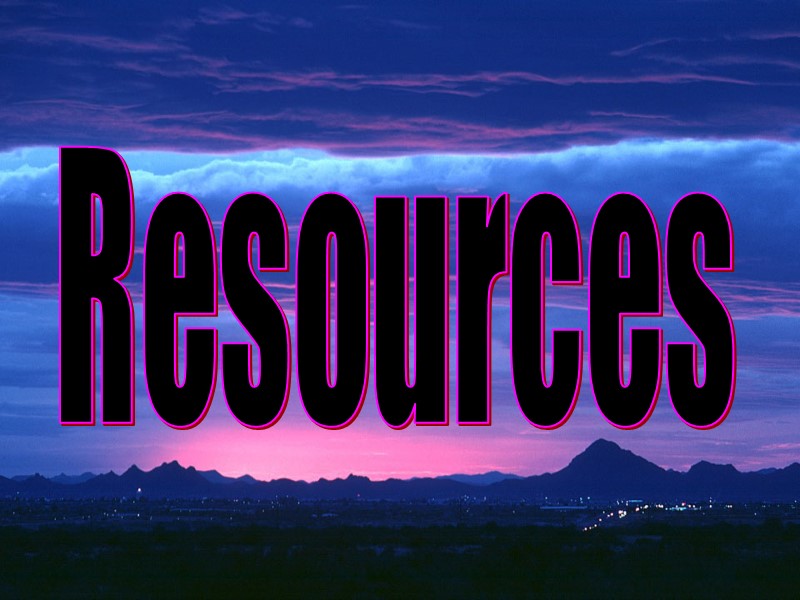
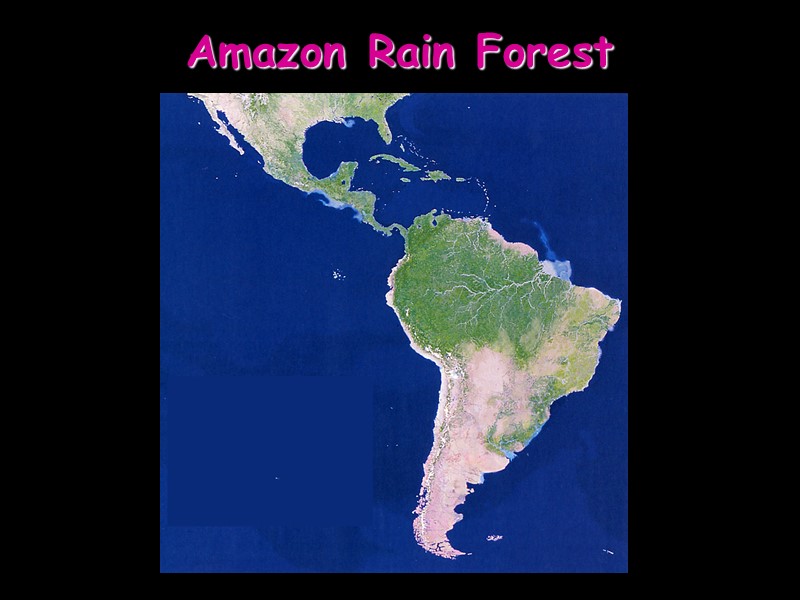
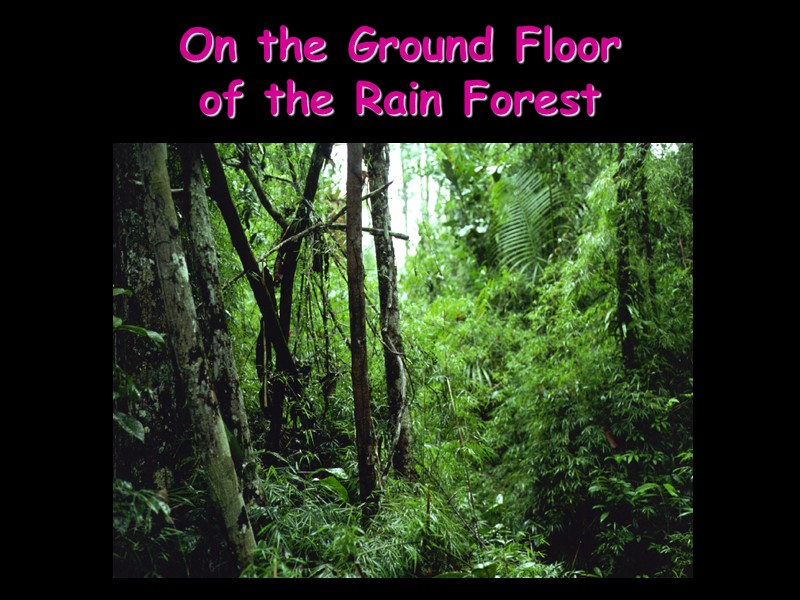
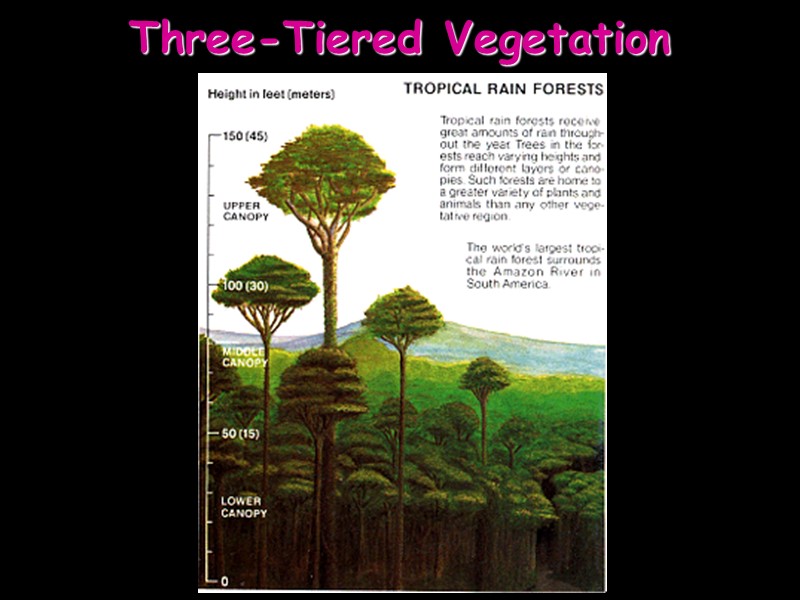
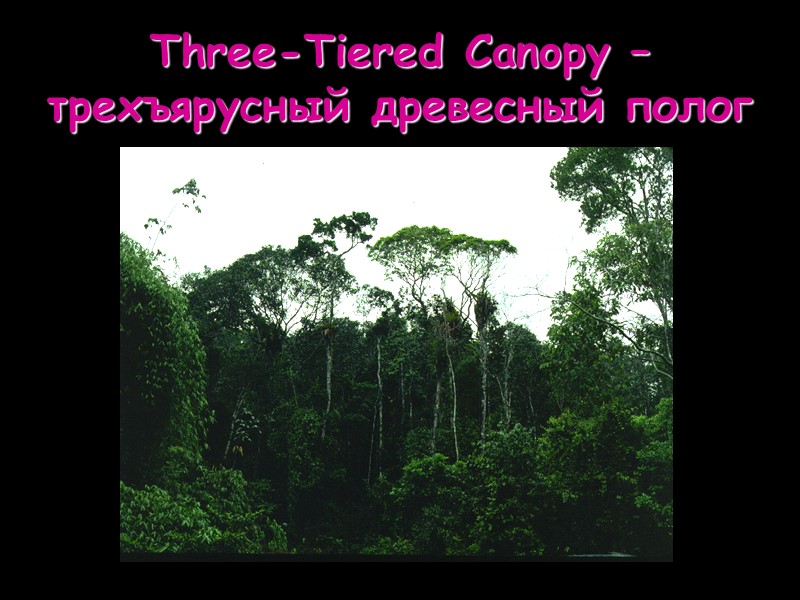
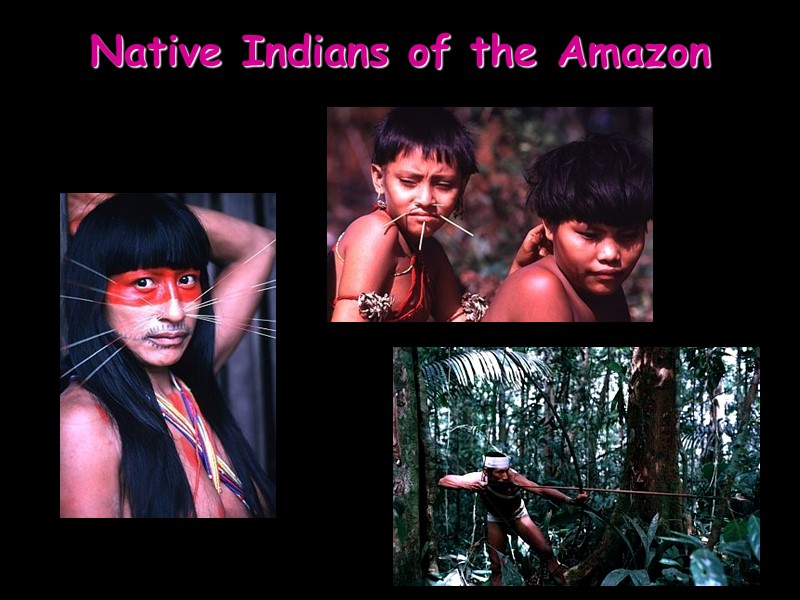
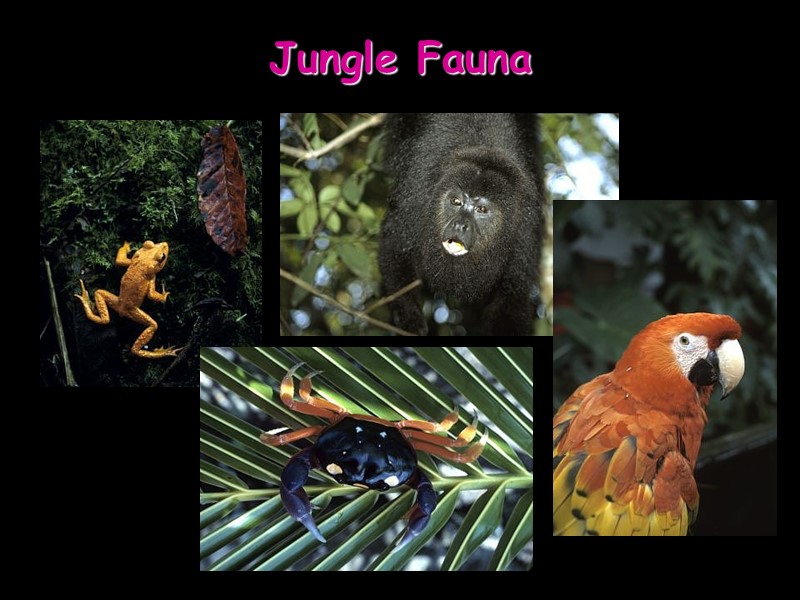
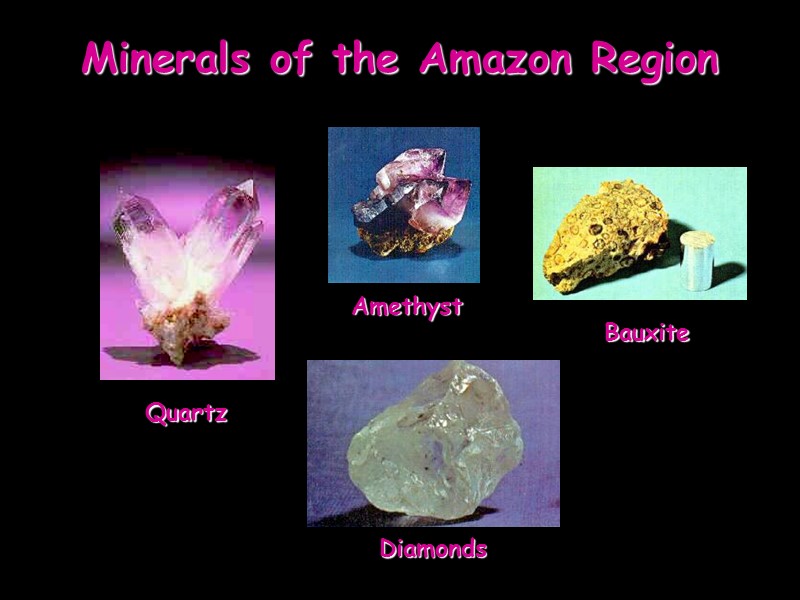
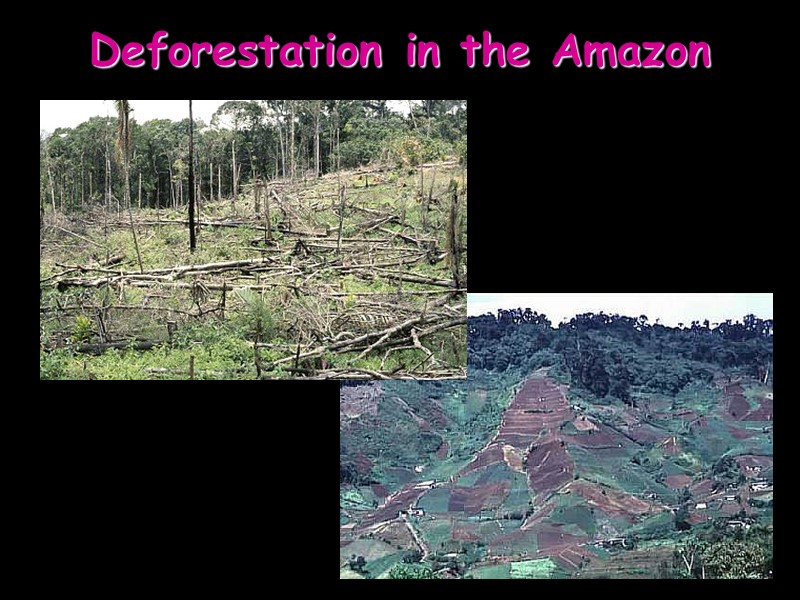
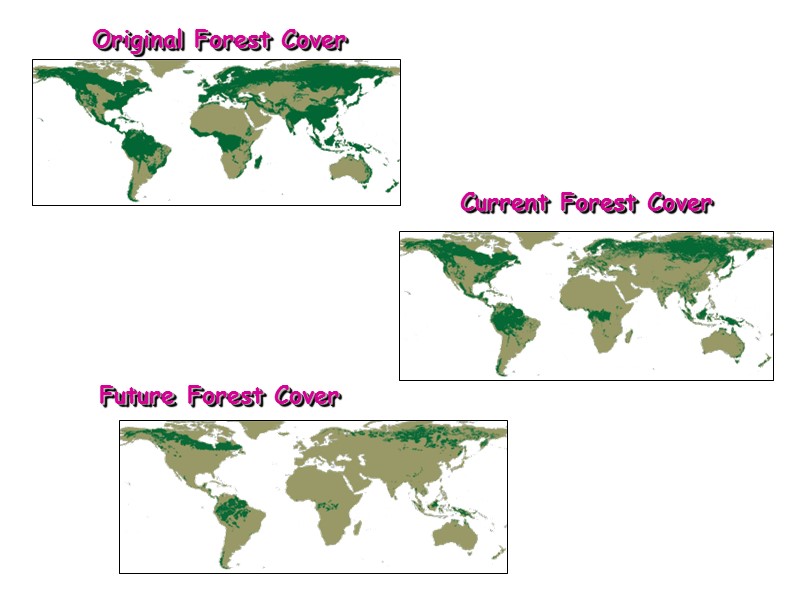
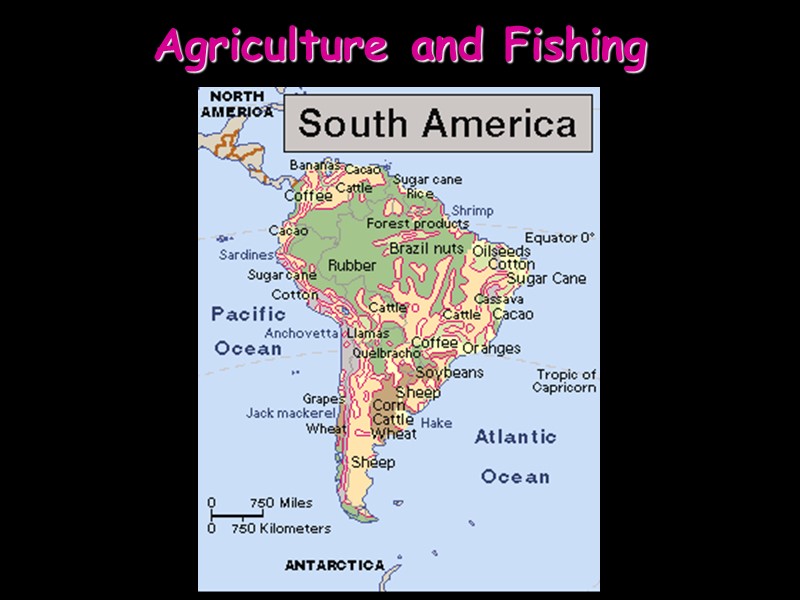
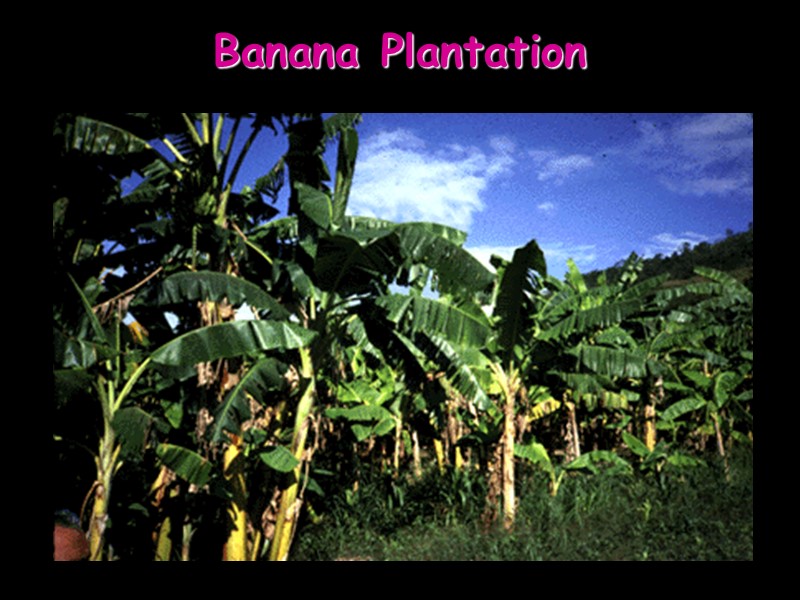
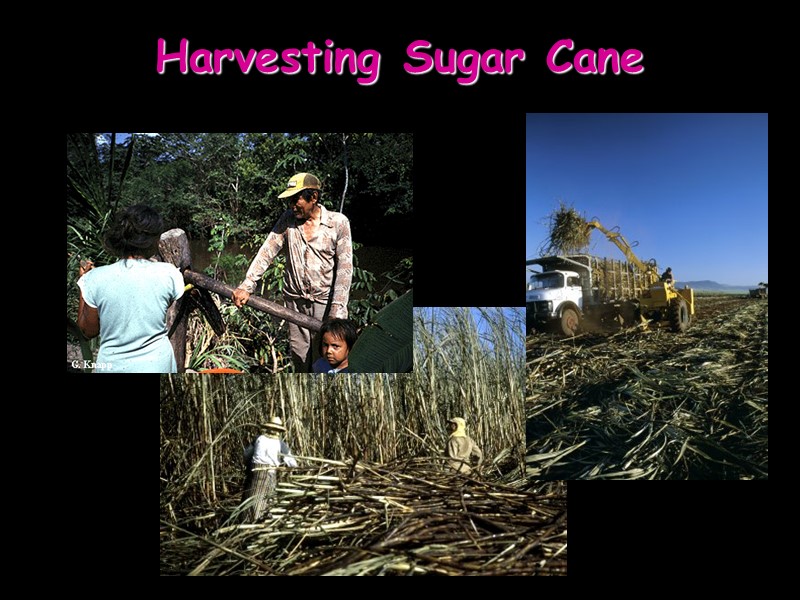
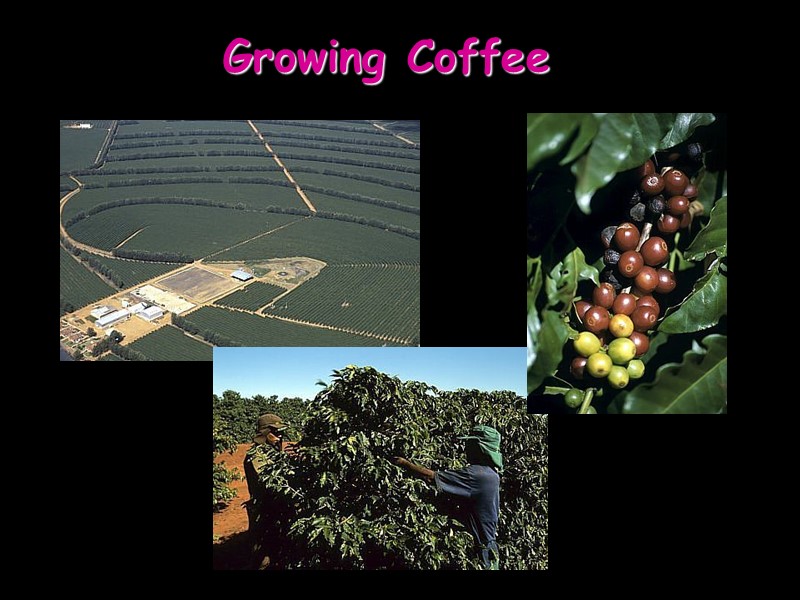

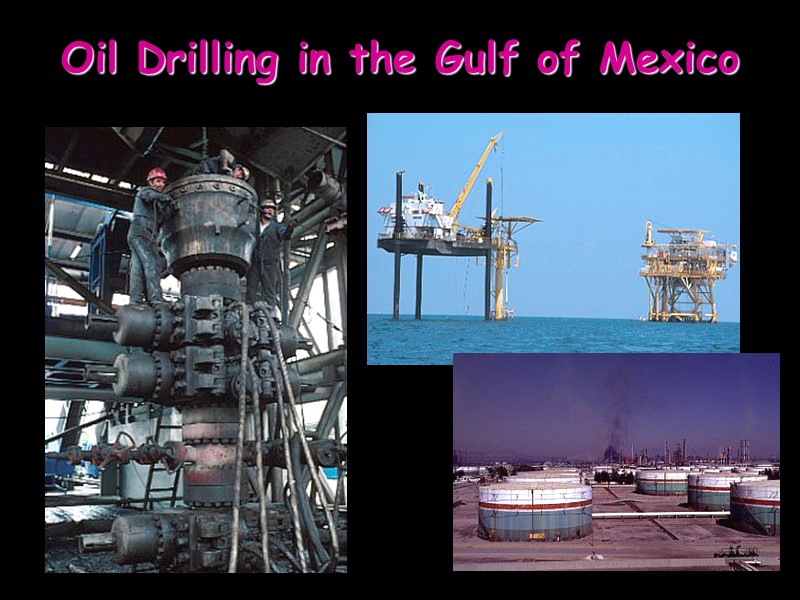
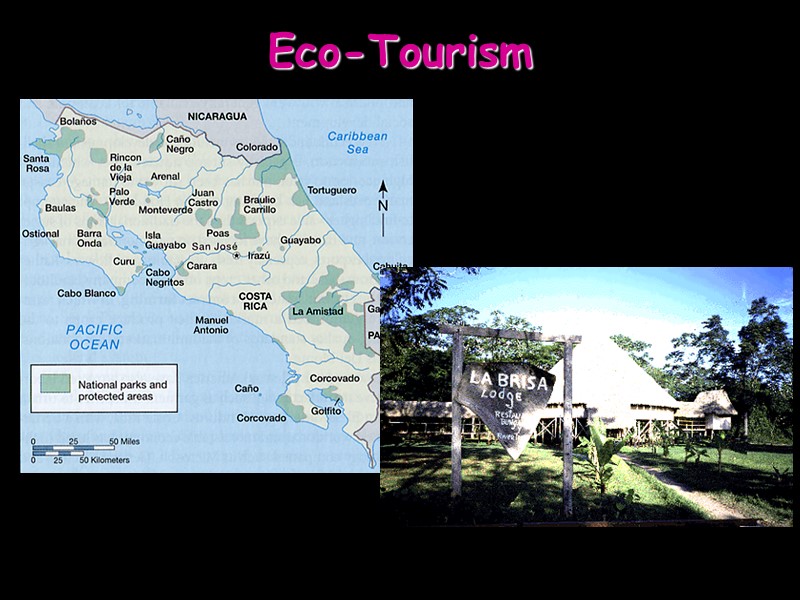
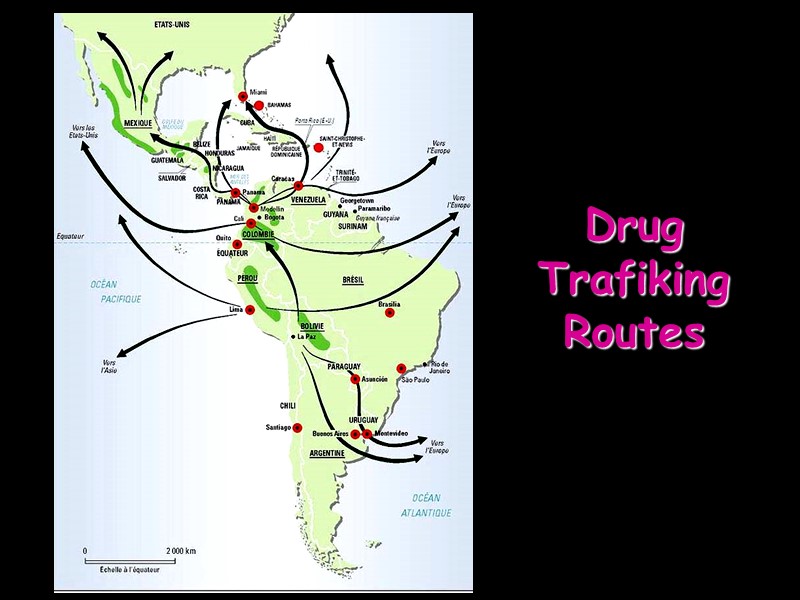

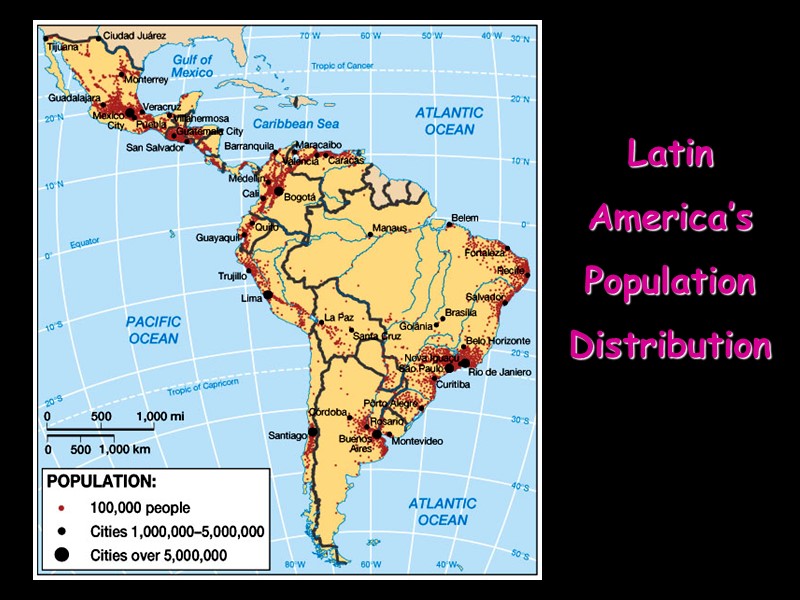
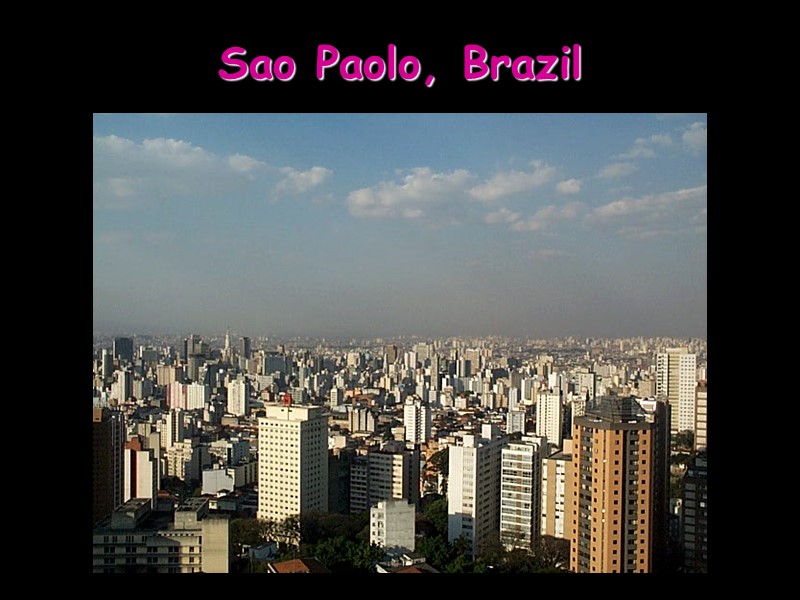
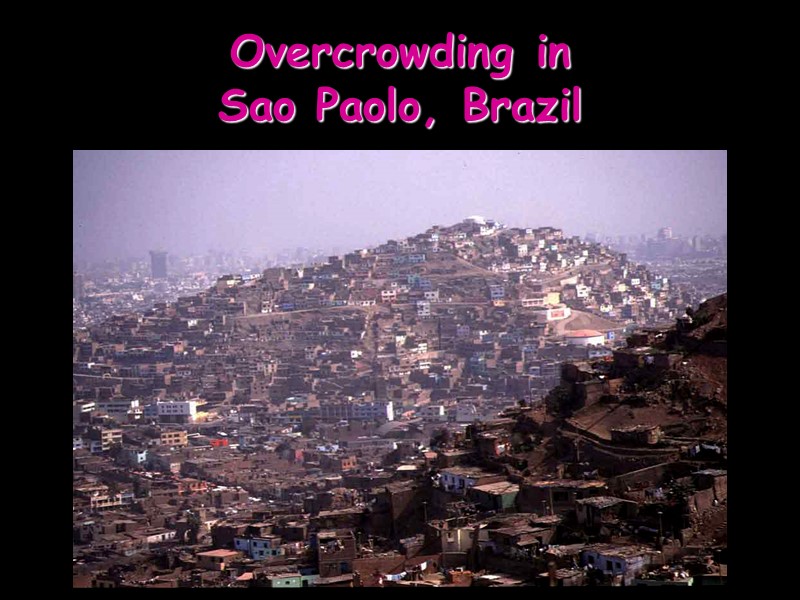
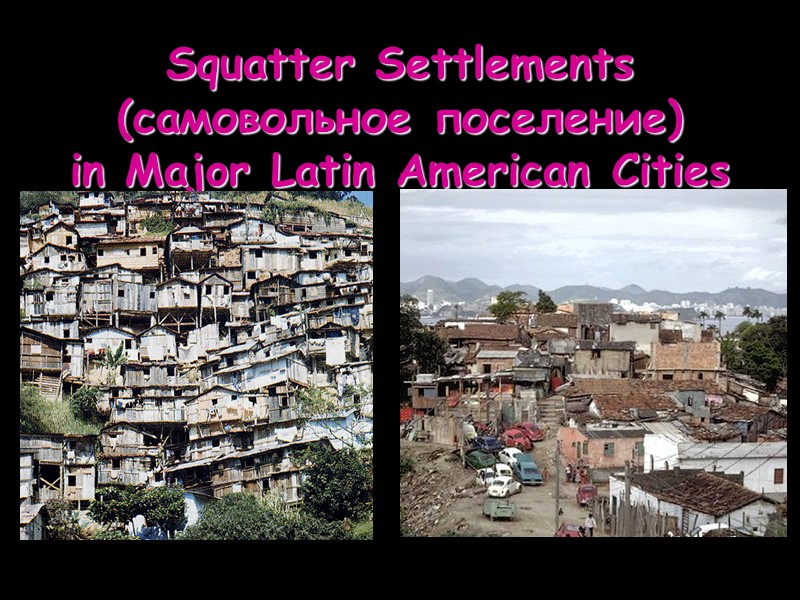
31792-latin_america._general_characteristic.ppt
- Количество слайдов: 63
 Latin America. General characteristic
Latin America. General characteristic
 Plan: Topography Climate Resources
Plan: Topography Climate Resources
 Latin America 19,1 million square km 12,6% of the earth’s surface Historical roots: Spain and Portugal Spanish and Portuguese based on Latin: Latin America Population – about 590 million
Latin America 19,1 million square km 12,6% of the earth’s surface Historical roots: Spain and Portugal Spanish and Portuguese based on Latin: Latin America Population – about 590 million
 Regions of Latin America 1. Middle America Mexico Central America 2. Caribbean a. Bahamas: b. Greater Antilles (Cuba, Jamaica, Puerto Rico, Haiti, and the Dominican Republic) c. Lesser Antilles 3. South America Central America The Caribbean South America
Regions of Latin America 1. Middle America Mexico Central America 2. Caribbean a. Bahamas: b. Greater Antilles (Cuba, Jamaica, Puerto Rico, Haiti, and the Dominican Republic) c. Lesser Antilles 3. South America Central America The Caribbean South America
 1. Central America
1. Central America
 2. Caribbean
2. Caribbean
 3. South America
3. South America
 Topography
Topography
 Satellite Image of Latin America
Satellite Image of Latin America

 Bodies of Water Atlantic Ocean Pacific Ocean Gulf of Mexico Caribbean Sea Amazon R. Orinoco R. Uruguay R. Magdalena R. Sao Francisco R. Lake Titicaca Lake Maracaibo Rio de La Plata Parana R.
Bodies of Water Atlantic Ocean Pacific Ocean Gulf of Mexico Caribbean Sea Amazon R. Orinoco R. Uruguay R. Magdalena R. Sao Francisco R. Lake Titicaca Lake Maracaibo Rio de La Plata Parana R.
 Lake Titicaca: World’s highest lake (3812 m above sea level, depth - 304m., the largest fresh water basin, 8290 sq. km)
Lake Titicaca: World’s highest lake (3812 m above sea level, depth - 304m., the largest fresh water basin, 8290 sq. km)

 Mountains and Peaks Andes Mts. Sierra Madres Mts. Guiana Highlands Brazilian Highlands Patagonian Plateau
Mountains and Peaks Andes Mts. Sierra Madres Mts. Guiana Highlands Brazilian Highlands Patagonian Plateau
 Andes Mountains (Peru)
Andes Mountains (Peru)
 The Eastern Flank of the Andes
The Eastern Flank of the Andes
 Llamas in the Andes
Llamas in the Andes
 The Sierra Madres, Mexico
The Sierra Madres, Mexico
 Guianan Highlands, Venezuela
Guianan Highlands, Venezuela
 Brazilian Highlands
Brazilian Highlands
 Patagonian Region (Chile)
Patagonian Region (Chile)
 Valleys Plains and Basins Amazon Basin Pampas Mato Grosso Gran Chaco Llanos
Valleys Plains and Basins Amazon Basin Pampas Mato Grosso Gran Chaco Llanos
 Amazon Rain Forest
Amazon Rain Forest
 Mato Grosso - a high plateau region in southwestern Brazil that forms a watershed between the Amazon and Plate river systems
Mato Grosso - a high plateau region in southwestern Brazil that forms a watershed between the Amazon and Plate river systems
 Orinoco Lowlands, the Llanos (an extensive grassy treeless plain in South America)
Orinoco Lowlands, the Llanos (an extensive grassy treeless plain in South America)
 Cattle Ranching on the Pampas (large treeless plains in South America)
Cattle Ranching on the Pampas (large treeless plains in South America)
 Deserts Atacama Desert
Deserts Atacama Desert
 Atacama Desert
Atacama Desert
 Cities Mexico City Havanna Port-au-Prince Panama City Santiago Lima Buenos Aires Brasilia Rio De Janiero Caracas Bogota
Cities Mexico City Havanna Port-au-Prince Panama City Santiago Lima Buenos Aires Brasilia Rio De Janiero Caracas Bogota
 Others Cape Horn - a rocky headland on an island at the extreme S tip of South America, belonging to Chile. It is notorious for gales and heavy seas; until the building of the Panama Canal it lay on the only sea route between the Atlantic and the Pacific Falkland Islands Cape Horn Panama Canal
Others Cape Horn - a rocky headland on an island at the extreme S tip of South America, belonging to Chile. It is notorious for gales and heavy seas; until the building of the Panama Canal it lay on the only sea route between the Atlantic and the Pacific Falkland Islands Cape Horn Panama Canal
 The Falkland Islands or Islas Malvinas
The Falkland Islands or Islas Malvinas
 Cape Horn
Cape Horn
 The Panama Canal
The Panama Canal
 Going Through the Panama Canal
Going Through the Panama Canal
 Atlantic Ocean Pacific Ocean Gulf of Mexico Caribbean Sea Amazon R. Orinoco R. Uruguay R. Magdalena R. Sao Francisco R. Lake Titicaca Lake Maracaibo Rio de La Plata Parana R. Andes Mts. Sierra Madres Mts. Guiana Highlands Brazilian Highlands Patagonian Plateau Amazon Basin Pampas Mato Grosso Gran Chaco Llanos Atacama Desert Mexico City Havanna Port-au-Prince Panama City Santiago Lima Buenos Aires Brasilia Rio De Janiero Caracas Bogota Falkland Islands Cape Horn Panama Canal
Atlantic Ocean Pacific Ocean Gulf of Mexico Caribbean Sea Amazon R. Orinoco R. Uruguay R. Magdalena R. Sao Francisco R. Lake Titicaca Lake Maracaibo Rio de La Plata Parana R. Andes Mts. Sierra Madres Mts. Guiana Highlands Brazilian Highlands Patagonian Plateau Amazon Basin Pampas Mato Grosso Gran Chaco Llanos Atacama Desert Mexico City Havanna Port-au-Prince Panama City Santiago Lima Buenos Aires Brasilia Rio De Janiero Caracas Bogota Falkland Islands Cape Horn Panama Canal
 Active Volcanoes
Active Volcanoes
 Climate
Climate
 Latin American Climatic Zones
Latin American Climatic Zones
 Very Varied Climate Zones
Very Varied Climate Zones
 Precipitation
Precipitation
 Resources
Resources
 Amazon Rain Forest
Amazon Rain Forest
 On the Ground Floor of the Rain Forest
On the Ground Floor of the Rain Forest
 Three-Tiered Vegetation
Three-Tiered Vegetation
 Three-Tiered Canopy – трехъярусный древесный полог
Three-Tiered Canopy – трехъярусный древесный полог
 Native Indians of the Amazon
Native Indians of the Amazon
 Jungle Fauna
Jungle Fauna
 Minerals of the Amazon Region Diamonds Amethyst Quartz Bauxite
Minerals of the Amazon Region Diamonds Amethyst Quartz Bauxite
 Deforestation in the Amazon
Deforestation in the Amazon
 Original Forest Cover Future Forest Cover Current Forest Cover
Original Forest Cover Future Forest Cover Current Forest Cover
 Agriculture and Fishing
Agriculture and Fishing
 Banana Plantation
Banana Plantation
 Harvesting Sugar Cane
Harvesting Sugar Cane
 Growing Coffee
Growing Coffee
 Rubber Industry
Rubber Industry
 Oil Drilling in the Gulf of Mexico
Oil Drilling in the Gulf of Mexico
 Eco-Tourism
Eco-Tourism
 Drug Trafiking Routes
Drug Trafiking Routes
 Demographics
Demographics
 Latin America’s Population Distribution
Latin America’s Population Distribution
 Sao Paolo, Brazil
Sao Paolo, Brazil
 Overcrowding in Sao Paolo, Brazil
Overcrowding in Sao Paolo, Brazil
 Squatter Settlements (самовольное поселение) in Major Latin American Cities
Squatter Settlements (самовольное поселение) in Major Latin American Cities

